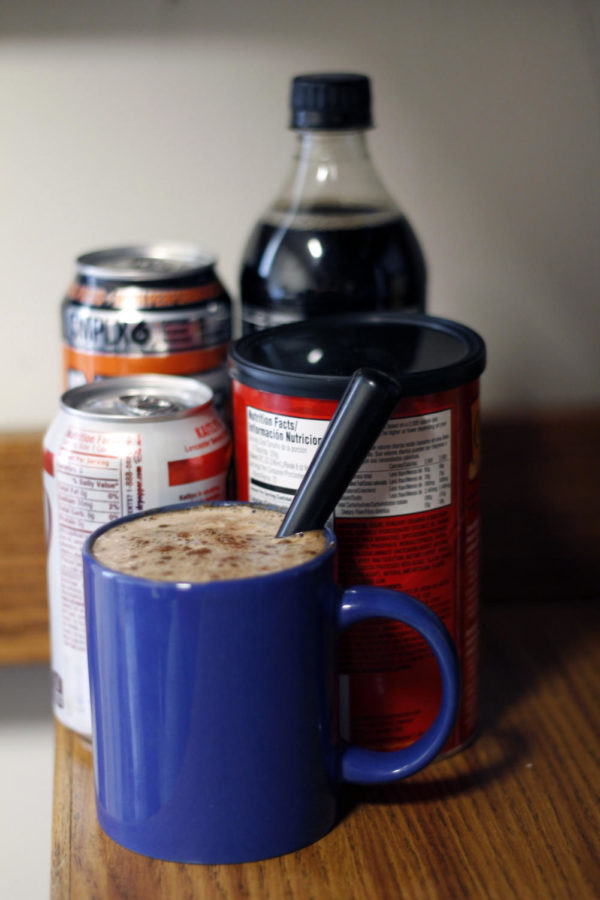Ellingson: Too much coffee has adverse effects
Photo Illustration: Adam Ring/Iowa State Daily
During times such as finals week, students turn to consuming drinks such as coffee, pop and energy drinks to help stay awake to get some last-minute studying in before exams.
March 19, 2013
Caffeine is one of the most abused drugs out there, with coffee as the leader. Many of us can’t make it through the day without a hot cup of coffee, and we’ve settled into a caffeinated routine each morning. Why do so many of us drink it? Because it’s a stimulant and gives us a false sense of energy that makes us feel like we’re awake and alert. However, like any drug, coffee has its side effects.
There are many short-term effects that can happen. It can cause jitters and worsen nervousness, so if you’re planning to stay up late cramming for a test and just drink a lot of coffee in the morning to stay awake through it (a typical college habit), that might actually be a detriment to your grade. It’s usually better if you get a decent amount of sleep the night before a test because sleep helps improve your memory and allows you to focus better (believe it or not, those two things are important for test taking).
It can cause heart palpitations, which are when you have the feeling of rapid, pounding or fluttering heartbeats. While usually harmless, in rare cases it can mask an underlying heart condition, such as arrhythmia (irregular heartbeat). With coffee-related palpitations, it’s usually because you’ve had too much caffeine and not enough water to offset it, which makes you dehydrated. It’s also a diuretic, which means you’ll urinate more frequently.
Not all coffee is low calorie. It can be fattening if you add milk, chocolate or other sugary substances to the drink. For instance, if you go to Starbucks, you’ll see several of their beverages in the 200-to-300-calorie range, depending on what you order. However, if you like to drink plain, black coffee, one cup only has about two calories in it.
Over time, coffee can have several adverse effects on the body.
You can become addicted. Caffeine is a drug, after all. Your body and mind might start to become dependent on coffee and not feel as though it can function without it. And if you stop drinking coffee after it has become an addiction, your body will go through a withdrawal. You’ll experience things like headaches, irritability, nausea, and sometimes even vomiting.
And finally, coffee can have a negative impact on your wallet. For those who go to a coffee shop every morning to get their fix, they will usually spend anywhere between two dollars and five dollars per cup each day. If you drink coffee frequently, that will add up very quickly. A simple solution to that would be to buy your own coffee maker — a decent one is around $30 (depending on how fancy you want to get) — and buy coffee grounds, which can be anywhere from $5 to $20, depending on how much it contains, the brand and the flavor. In either case though, you’re still spending quite a bit of money to feel “awake.”
However, there are ways to get by without coffee. Mainly, you should actually get the recommended hours of sleep each night. I know in college staying up late might be a necessary evil because there just isn’t enough time to get everything done for class and work. But in general, if you have the option of getting a good amount of sleep, it’s in your best interest to take advantage of that. You’ll wake up feeling more rested, and coffee won’t be such a necessity. It’s also good for your body’s metabolism as well, especially for those who are dieting or trying to stay fit. Overall, your body just functions better when you get enough sleep.
There are also several other alternative beverages you could try if you’re looking for an energy boost. Various kinds of tea are becoming more and more popular, especially green tea and black tea. In addition, they are a lot healthier and better for your body than coffee.
Coffee in moderation isn’t necessarily a bad thing, but if you notice your body is becoming dependent on it then you might try something new.
Caitlin Ellingson is a senior in journalism and mass communication and environmental studies from Milo, Iowa.







